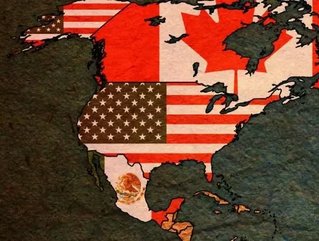NAFTA: Would withdrawing benefit the US?

Around one third of US trade is with Canada and Mexico. Manufacturing unions blame NAFTA for sending US manufacturing jobs abroad and President Trump campaigned on a platform to reverse the offshoring of recent years. The question is whether withdrawing from NAFTA would be of economic benefit to the US? There is no doubt that NAFTA is in need of reform. It was originally set up in 1994 before the digital and e-commerce era. The US has produced a list of negotiating objectives.
The top priority is to reduce the trade deficit with NAFTA, though this is somewhat bizarre since trade is almost in balance. Most of the US trade deficit is with China. The other priorities initially seemed reasonable and read more like an aspiration to move towards a Single Market with the harmonization of rules. Unfortunately, the US then made some additional demands around US content shares in autos, access to public works contracts, reducing the role of the dispute mechanism and dismantling Canada’s supply management system for dairy and poultry. While these were initially deemed as unpalatable by Canada and Mexico, they appear reluctantly to be coerced towards a compromise.
See also:
There is ambiguity about the ability of President Trump to withdraw from NAFTA without the approval of Congress. At a minimum he has to give six months’ notice and even this could be subject to legal challenge. This period of uncertainty would probably be used to strike a deal. But what would be the cost if the US did withdraw? In this case tariffs would be introduced in line with the most-favoured nation principle. This implies an average tariff of around 3.5% on US imports, but weighted by the share of trade actually covered by NAFTA and the types of goods, the effective tariff would be not much more than 2%. So the static cost appears relatively small, but this probably understates the damage given the negative impact on US exports and disruptions in cross-border supply chains. Still, it should not be as bad as a hard Brexit since border controls and customs checks are already in place.
There is a serious risk that President Trump issues the notice to withdraw from NAFTA, but this would most likely be part of an aggressive negotiating strategy from the US. This could lead to some further concessions from Mexico and Canada as ultimately falling back on WTO rules is in no countries’ interest. In addition, given the economic hit would be more severe in Mexico and Canada (as they have extremely high trade shares with the US) both their exchange rates would be liable to weaken against the US dollar, wiping out any incentive to move production back to the US. The bigger danger is what the US approach to NAFTA implies for US handling of wider international trade issues. The US has already imposed tariffs on some specific product areas (solar panels, washing machines) and is looking into aluminium and steel. At least this followed a process and is not just a snap decision from President Trump. The main worry is the potential for the US probe into Chinese intellectual property practices to trigger trade sanctions which could then spark a trade war. In the meantime, talking down the dollar will help President Trump meet some of his objectives, even if eventually it only ends up delivering higher inflation and interest rates.
Tim Drayson, MacroMatters
- Replacing NAFTA: what it means for CanadaLeadership & Strategy
- Just 33% of Canadian business directors expect the economy to improve within five yearsLeadership & Strategy
- IMF: Canadian economy facing risks to competitiveness following US tax reformsLeadership & Strategy
- Feature: An optimistic road ahead for Canadian tradeLeadership & Strategy






